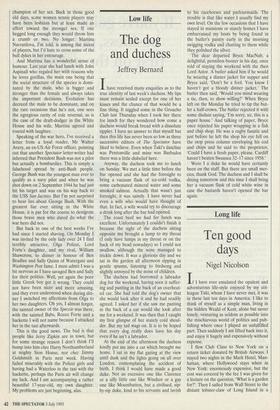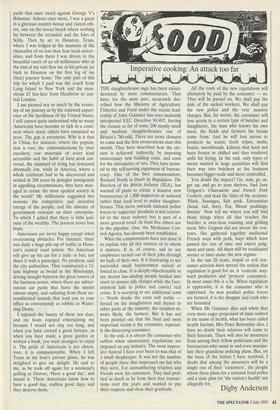Long life
Ten good days
Nigel Nicolson
If I have ever emulated the opulent and adventurous life-style enjoyed by my col- league Taki, whom I have never met, it was in these last ten days in America. I like to think of myself as a simple man, living in the hidden Weald of Kent, alone but never lonely, venturing as seldom as possible into the mischievous world of politics and pub- lishing where once I played an unfulfilled part. Then suddenly I am lifted back into it, and enjoy it hugely and expensively without expense.
I flew Club Class to New York on a return ticket donated by British Airways. I stayed two nights in the Mark Hotel, Man- hattan, where Hollywood stays when in New York: enormously expensive, but the cost was covered by the fee I was given for a lecture on the question, 'What is a garden for?'. Then I sailed from Wall Street to the distant lobster-claw of Long Island in a yacht that once raced against George V's Britannia. Ashore once more, I was a guest in a glorious country-house and visited oth- ers, one on the ocean beach where nothing lay between the verandah and the Isles of Scilly. Then by air to Houston, Texas, where I was lodged in the mansion of the chancellor of no less than four local univer- sities, and from there I was driven to the beautiful ranch of an oil millionaire who at the end of my visit flew me in his private jet back to Houston on the first leg of my (free) journey home. The only part of this trip for which I paid was the coach from Long Island to New York and the mon- strous £5 bus-fare from Heathrow to cen- tral London.
I am pleased not so much by the econo- my of my journey as by the renewed experi- ence of the lavishness of the United States. I still cannot quite understand why so many Americans have become so rich in a conti- nent where many others have remained so poor. The gap is enormous. Why is it that in China, for instance, where the popula- tion is vast, the communications by river excellent, raw materials of every kind accessible and the habit of hard work uni- versal, the standard of living has remained abysmally low, while in America, where a whole continent had to be discovered and settled in 200 years by polyglot immigrants in appalling circumstances, they have man- aged to create the most opulent society in the world? My millionaire suggested two reasons: the competitive and inventive energy of the people, and the absence of government restraint on their enterprise. To which I added that there is little jeal- ousy of the wealthy. The poorest never lose hope.
Americans are never happy except when overcoming obstacles. For instance, there was daily a huge pile-up of traffic in Hous- ton's central road system. No American will give up his car for a train or bus, nor share it with a passenger. No problem, said the city authorities. They constructed a 12- lane highway as broad as the Mississippi, driving straight between the great towers of the business centre, where there are subter- ranean car parks that leave the streets almost empty, and radiating from them air- conditioned tunnels that lead you to your office as conveniently as rabbits to Water- ship Down.
I enjoyed the luxury of these ten days, and my hosts enjoyed entertaining me because I would not stay too long, and when you have earned a great fortune, as when you have made a great garden or written a book, you want strangers to enjoy it. The pride of Americans is not obnox- ious: it is companionable. When I left Texas in my host's private plane, he was delighted to give me delight. He said to me, as he took off again for a weekend's golfing at Denver, 'Have a good day', and meant it. These Americans know how to have a good day, endless good days, and they deserve them.



















































 Previous page
Previous page